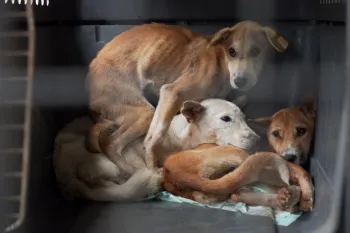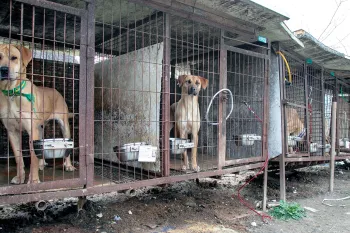SEOUL—Ahead of South Korea’s dog meat ban coming into force in February 2027, Korean American actor Daniel Henney has helped charity Humane World for Animals rescue 67 dogs who were trapped on a dog meat farm in South Korea. As the country’s estimated 1,500 dog meat farms begin to close ahead of an industry ban coming into force in 2027, the ‘Wheel of Time’ star joined Humane World for Animals (formerly called Humane Society International) at a farm in Cheongju to save the dogs and fly them to the United States to seek adoptive families.
The farmer Mr. Yu had bred dogs for human consumption for 40 years, also serving the meat at his restaurant next to the farm. While he sold the restaurant some years ago, he continued to farm dogs to supply slaughterhouses and markets elsewhere. His farm was closed down by Cheongju authorities in February for cruelty violations―he slaughtered dogs on the farm in breach of the Animal Protection Act―and Humane World for Animals Korea was asked to step in to help the dogs, including newborn puppies and pregnant moms. They had endured lives of almost total deprivation confined in barren, metal cages. The dogs did not receive adequate food; some have deformed bones due to rickets caused by nutritional deficiency.
Mr. Yu plans to expand his existing small chili farming operation, replacing dog cages with rows of seedlings and moving entirely into crop farming in readiness for the dog meat ban enforcement.
Daniel Henney has been a prominent advocate for Humane World for Animals’ campaign to end the dog meat industry in South Korea for many years, including launching an advertising campaign on the Seoul subway in 2017 featuring a dog once bred for meat, and even adopting golden retriever Juliette, who was rescued from a dog meat farm by Humane World for Animals in 2020.
On the farm in Cheongju, Henney rolled up his sleeves and helped Humane World for Animals’ rescue team remove some of the frightened dogs from their cages for the first time. Henney said: “As a huge dog lover, and dad to a dog meat farm survivor, it was incredibly challenging to see the suffering of these dogs who have endured so much. It makes me all the prouder to have supported Humane World for Animals’ successful campaign to achieve a ban because it means no more dogs like these will suffer like this again. South Korea is embracing a new chapter where dogs are our friends not food, and that couldn’t make me more thrilled. I’m looking forward to following the journey of these dogs as they find their forever homes in the United States and put the dog meat industry behind them.”
The first 50 dogs from the farm have already arrived at Humane World for Animals’ care and rehabilitation center in Maryland, U.S., where they will receive veterinary treatment and rehabilitation before moving to shelter and rescue placement partners for adoption. A further 17 dogs—moms and puppies— will follow on once all are old enough to fly. For now, they are recovering at a nearby shelter in Cheongju. All but one are Jindo mixes, a breed typically found on dog meat farms.
According to official statistics, around 40% of dog farms in South Korea have closed since the Special Act was passed in January 2024 and the Ministry of Agriculture anticipates that will reach 60% by the end of this year. While some dog farmers are taking the opportunity to retire, others are moving into alternatives businesses, for which the government provides financial support. Prior to the ban, Humane World for Animals’ Models for Change program (launched in 2015) worked co-operatively with farmers to permanently close 18 dog meat farms and rescue more than 2,700 dogs.
Sangkyung Lee, Humane World for Animals Korea campaign manager, says: “In all the years our charity has been rescuing dogs from these dog meat farms, this is the first time we have done so knowing that a ban is finally consigning this terrible suffering to the history books. That’s an amazing feeling. While the law is successfully dismantling the dog meat industry, we are happy to be able to provide a bright future for the dogs on this farm. For them the dog meat industry is over, and they have nothing but soft beds, full bellies and lots of love ahead of them.”
While three Jindo dogs originally from the farm did find adoptive homes locally in South Korea, a stigma against dogs from meat farms persists in the country, making finding homes for the other 67 dogs less likely. In the United States they have a better chance of finding families quickly, but Humane World for Animals will continue to promote dog adoption in South Korea to increase the prospect of future happy endings for more dogs.
Fast facts:
- Humane World for Animals’ rescues are conducted in compliance with national and local health and safety protocols including evaluation by a veterinarian and vaccination against rabies, distemper, hepatitis, parvo virus, parainfluenza, leptospira and canine influenza, as well as screening for respiratory illness as needed to ensure the health of each animal and comply with international export and import requirements.
- South Korea’s ban or Special Act on the dog meat industry was unanimously passed in the National Assembly in January 2024. It comes into full effect in February 2027 making it illegal to farm, kill, butcher or sell dogs or dog meat for human consumption, with penalties of up to two years in prison and a fine of up to ₩30 million (US$20,637).
- Ministry of Agriculture statistics estimate there were 5,898 dog meat businesses at the time of the Special Act passing which include 1,537 farms, 221 slaughterhouses, 1,788 traders and 2,352 restaurants.
- Latest opinion surveys show that most South Koreans (86%) don’t have any interest in eating dog meat.
- Dogs suffer immensely on dog meat farms, both physically and mentally. They spend their entire lives in small, barren, wire cages without proper food, water, stimulation, comfort, shelter or veterinary care. Death is by electrocution.
- Humane World for Animals South Korea is the Seoul office of international animal protection charity Humane World for Animals that campaigns across Asia and with local partner groups in China, Indonesia, South Korea, India and Viet Nam to end the dog and cat meat trade.
Download photos and video of:


